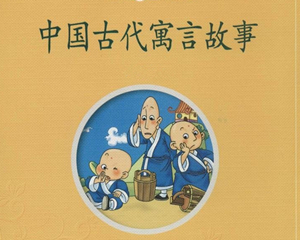古代寓言原是民间口头创作,文学体裁的一种。含有讽喻或明显教训意义的故事。它的结构简短。主人公可以是人,可以是动物,也可以是无生物。多借用比喻手法,使富有教训意义的主题或深刻的道理在简单的故事中体现,而还需要自己去理解,思考,这就是和西方寓言的不同之处。

《古代寓言·鸩鸟和毒蛇》
鸩与蛇相遇,鸩前而啄之。
蛇谓曰:“世人皆毒子矣,毒者恶名也,子所双有恶名者,以食我也,于不食我则无毒,不毒则恶名亡矣。”
鸩笑曰:“汝岂不毒于世人哉!指我为毒,是欺也。夫汝毒于世人者,有心啮人也,吾怨汝之啮人,所以食汝示刑也。世人审吾之能弄汝,故畜吾以防汝,又审汝之毒染吾毛羽肢体,故用杀人。吾之毒,汝之毒也。吾疾恶而蒙其名尔;然杀人者,人也,犹人持兵而杀人也。兵罪乎?人罪乎?则非吾之毒也明矣。世人所以蓄吾而不蓄汝,又明矣。吾无心毒人,而疾恶得名,为人所用,吾所为能全其身也。全身而甘恶名,非恶名矣。汝以有心之毒盱睢于草莽之间,伺人以自快。今遇我,天也,而欲诡辩苟免卯邪?”
蛇不能答,鸩食之。
——《无能子》
The Falcon and the Adder
The falcon met an adder on the road and advanced to peck at it.
"Don’t you peck me!" said the adder to the falcon. "People say you’re poisonous. That’s a bad thing to be called, and it’s because you eat us. If you don’t eat us you won’t get our venom in you and people will no longer hate you."
"Quiet, you!" scoffed the falcon. "It’s a lie to say I’m poisonous. It’s you who bite men with malicious intent, and I’m eating you to punish you for your crimes. People keep me because they know I can bring you to account. They know too that my limbs and feathers are contaminated with your venom; that is why they use these as a means to poison others. But that’s no concern of mine. It’s like the weapon a man uses to kill someone. Is the weapon to blame? Or the man? I don’t harm people willfully, and I’m used as a weapon against wickedness. But as for you, you lurk in the grass, intent on harming people. Fate has ordained that you should come my way today. No sophistry can help you."
So saying, the falcon swallowed up the adder.
Wu Neng Zi
更多精品翻译素材,敬请关注可可英语。











